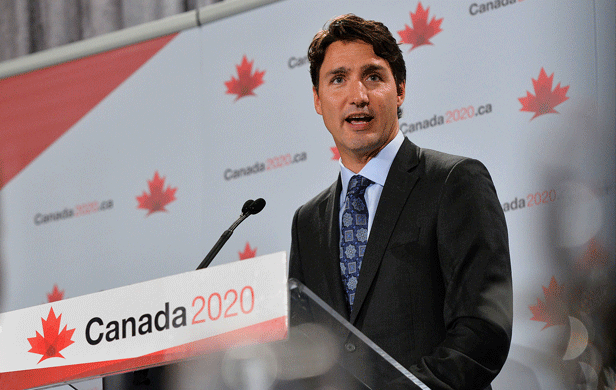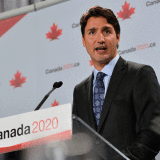
Many a pundit has pointed out that the worst thing that could happen for Stephen Harper in the homestretch of the federal election campaign is for either of his opponents’ support to collapse, consolidating progressive votes around a single challenger. Well, if recent polls are any indication, that’s precisely what is happening – and Justin Trudeau appears to be the chosen one.
Just look at CBC’s Poll Tracker (as of Oct. 6): Out of the eight national polls conducted in October, Trudeau has topped 6 of them while Mulcair has placed a distant third in all but one. Three of the four most recent national polls have Trudeau at 35% or more, with a several point lead over Harper (granted these are all within the margin for error, but still…).
Trudeau has averaged 33.25% over these eight polls to Mulcair’s 25% and Harper’s 31.9%. Now, national polls are far less germane than local ones and the Conservatives’ famous ground game is likely to turn out their base on election day. For these reasons, despite Justin’s consistent edge in the national polls, as of today, CBC’s Poll Tracker is predicting 8 more seats for Harper in what would be a relatively weak minority government. But if Mulcair’s numbers were to tumble any further, that could increase Trudeau’s seat count and bolster the case for strategic voting, making a majority government hopeless for Harper, and, quite possibly, even a minority one.
What happened?
Earlier on in the campaign, the safe “progressive” money was on Mulcair (I put that in quotes to acknowledge that a vote for Trudeau and a vote for Mulcair are not one and the same in terms of policy), as he led a tight three-way race for much of the first half and voters seemed reluctant to put their faith in a young Trudeau whose inexperience was a favourite target for Harper’s election advertising.
But a few things have changed since then. Trudeau adopted a tougher posture in later debates, in response to critics’ concerns that he was too soft in the first one. Meanwhile, the Niqab controversy – the wildcard of the campaign – appears to have hurt Mulcair worse than Trudeau, despite the fact that they’ve essentially taken the same position. This is because the issue has tracked more with Quebec voters, whom Mulcair was relying on more heavily than Trudeau.
This time around, Strategic Voting may be real
Lastly, it’s possible that in this anomaly of federal elections, the notion of strategic voting – which typically fares better on paper than in practice – could finally be manifesting itself. Well-organized groups like Leadnow have run a strong ground game driving the initiative and the unprecedented splitting of the polls may be enough to make it a factor in 2015.
Now, strategic voting means that how candidates are looking in a specific riding is ultimately far more important than what national polls are saying heading into election day. Voters intent on unseating Harper may be more justified in backing the NDP – especially in many BC and Quebec ridings – or the Liberals in places like Ontario and Atlantic Canada. But with the national polls the way they’re looking today, there will likely be a growing number of ridings where Trudeau is the answer.
Lesser of two evils?
For some, the idea of throwing their support behind Trudeau will be stretch. This is one of the main challenges with strategic voting – not all anti-Harper parties and candidates are created equal. Many “progressive” Canadians – myself included – have acknowledged their discomfort with some of Mr. Trudeau’s policies in the past, most notably in recent times his position on Bill C-51. And environmentally, both Mulcair and Trudeau have tip-toed around pipelines and the oilsands/tar sands and disappointed critics of trade deals with their lack of vocal opposition.
But the question is whether self-identifying progressive voters believe that Trudeau, when compared with another Harper Government – especially a majority one – is indeed the lesser of two evils. If so, and polling trends continue along this trajectory, he has more than a fair chance of following in his famous father’s footsteps to 24 Sussex Drive.
But, as they say, in politics, two weeks is an eternity.


It never ceases to amaze me how Bay Street and the Fifth Estate seem so intent on pushing Junior as the “real change” we all need.
Folks, do the math.
Justin needs to win 100+ seats to form a government. Mulcair needs only 30. Despite the hostility of rags like this and Libservative lapdogs like Peter Mainsbridge and the CBC, the Orange Wave soldiers on. A *lot* of young people are on the NDP’s side. And *most* of the Aboriginal vote.
I predict that when Oct 20th dawns, the polls will be universally recognized for the irrelevant crap that they are. They say the NDP couldn’t become the Opposition. Then they said we couldn’t win Alberta. Now they’re saying we can’t win the election.
Relax. We got this.
The Niqab is a huge issue, especially in Quebec, and the NDP gave the election away by taking a very unprincipled stand on the issue. Seriously, who can deny that the Niqab is the very symbol of a severely misogynistic culture where women have literally fewer rights than cattle, where they are under the complete, 100%, total control of men, and where they can still be stoned to death for reporting a rape or speaking out against their husbands in any way. And the people who have actually spent serious time in the Mid East with women, like author Phyllis Chesler, say that virtually 100% of women oppose the Niqab, but must say in public they want it, under threat of severe beatings or worse from their husbands. So it has nothing to do with a women’s right to choose. As Chesler states, no free-thinking women would choose to wear a hot, stifling, uncomfortable, unsanitary, mobile prison.
Although I support the NDP, their lack of a stand on the Niqab issue has disappointed me, and may have handed the election to Harper. “It’s up to the courts” they say. Not so. The people, through our government write all laws. The law serves us. We do not serve our laws. If there is something written in a book somewhere saying we have to allow the horrid Niqab, then we need to change that book.
I’m sorry to see so many NDP supporters ignoring the fact that this should never, ever have been made an election issue. It was 100% intended to create a rift between Canadians, to degrade a particular sector of our population, to exploit religious beliefs, to further instill fear and act as a distraction to Conservative wrongdoings.
I am glad to see both Mulcair and Trudeau adhere to the laws of the country…but I am very discouraged that the media continues to exploit an issue that has no place being argued in the public domain. There are far more important issues that affect millions more people, such as climate change, war, immigration, global trade deals, jobs, environmental crimes…
As the possibility increases that the strategic vote will be a Liberal vote for many, I feel increasingly worried about Trudeau’s take on electoral reform. Since 2004, electoral reform has been the subject of 10 separate provincial and federal studies. While all the opposition parties are in favour of electoral reform, it’s only the Liberals who believe more study and a national referendum is required before reform can be legislated.
What’s this about a required referendum? A majority of Canadians say they want electoral reform, yet whenever it goes to referendum — it’s happened twice in BC — the question is worded and marketed in a way that sends voters running. Trudeau says he’ll call for a referendum on electoral reform when there’s no need to call for a referendum, and he’s the only leader who’ll call for a referendum.
Is this what commitment to electoral reform looks like to you?
You are badly misinformed… The Liberals have committed to this being the last election under first-past-the-post should the Liberals form the next Government of Canada… The big difference being that unlike the NDP and the one option of “Proportional Representation” (one that’s been twice rejected via provincial referendums) want forced on Canadians ALL forms fairer voting, including Ranked Voting, which all political parties use to select their leaders and candidates that are contested with multiple candidates as occurs in ALL Canadian Ridings in elections… Cost, ease of understanding, simplicity in implementing, and many other factors will be studied to ensure the BEST choice for Canadians is the result of the change in Canadian Elections made to replace our current FPP system…
Totally off topic but…I was wondering why a tiny country like Brunei (pop:400,000) would be involved in the TPP but China and India were not.
I think I have found a common denominator and it involves BC.
All of the participants have or want access to cheap long term supplies of LNG and BC seems to be high on their future agendas if they could only get favourable conditions.
I believe harper and the unusually quiet clark have made significant concessions on our resource and the details will be deeply buried in the pact and is part and parcel of all the secrecy.
http://themalaysianreserve.com/new/story/petronas-may-defer-canada-lng-project
Libs and Cons= Good cops, bad cops. Both parties cop outs for the oligarchs.
Polls had the Kim Campbell Con winning a majority government by 44 percent.
He who pays the piper picks the tune. Don’t be taken in.
An irresponsible article from the Common Sense Canadian. The strategic vote entirely depends on the riding. In most of rural BC, the strategic vote is NDP. Voting Liberal here will split that vote, allowing the Con to take the seat.
I acknowledged that Janice – TWICE. At the same time, Trudeau’s rise in national polls is not without interest to those concerned with electing another Harper government. I don’t see how that’s irresponsible.
Do you want a change of government in the 2015 Canadian election? Vote for the strongest candidate in your riding who isn’t a member of the current governing party.
http://anyonebutharper.net/
Concisely put, Roy.
For the unintiated.
How does one determine the “strongest candidate in your riding”?
Polls? debates?